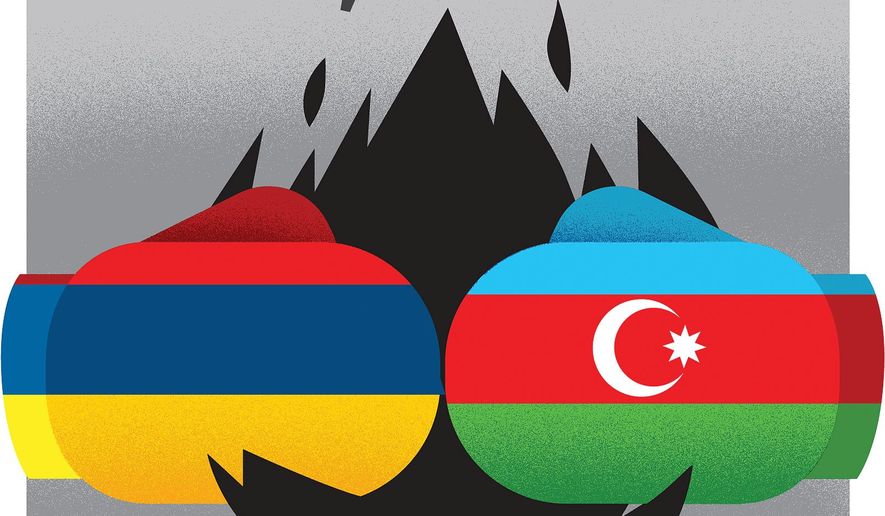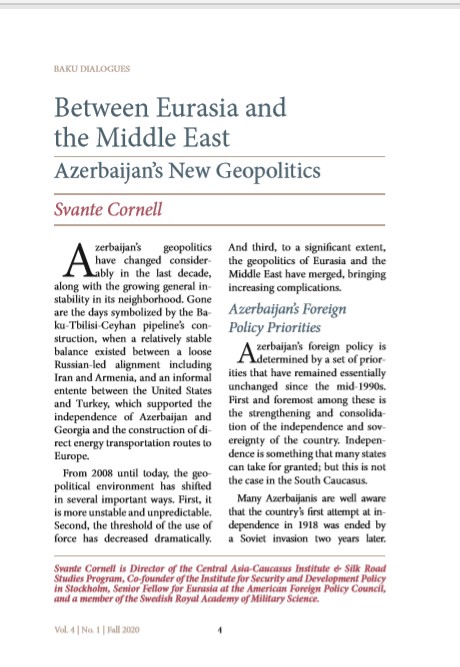Resources on the Armenia-Azerbaijan Conflict
The Central Asia-Caucasus Institute & Silk Road Studies Program have a long track record of covering the Armenia-Azerbaijan Conflict. This page presents the key resources and most recent analysis.
In 2017, Palgrave published the first book-length study of the International Politics of the Armenia-Azerbaijan Conflict, edited by Svante Cornell. The book concluded by arguing that if international efforts to resolve the conflict are not stepped up, “the ‘four-day’ war of April 2016 will appear a minor skirmish compared to what is sure to follow”.
In 2015, CACI & SRSP released the Silk Road Paper “A Western Strategy for the South Caucasus”, which included a full page of recommendations for the U.S. and EU on the Armenia-Azerbaijan conflict. These are reproduced below:
------------------
Develop a substantial and prolonged Western initiative on the Armenian-Azerbaijani conflict.
o This initiative must be led by the United States, in close consultation with its European partners – primarily the EU Commission and External Action Service, and France. Barring some process to reinvigorate the Minsk Process – a doubtful proposition given Western-Russian relations in the foreseeable future – Western leaders must be prepared to bypass that process, utilizing it where appropriate but focusing their initiative on developing direct negotiations between the Armenian and Azerbaijani leaders.
o The U.S. and its European partners must abandon the practice of relying solely on the Minsk Group co-chairs to resolve the Karabakh conflict. These diplomats have contributed greatly to formulating a workable framework agreement. However, strong and sustained U.S. Government leadership from the top level is needed to complement or, failing that, to replace the Minsk Process. In practice, this means the expressed support of the President, involvement of the White House, and leadership manifested in the appointment of a distinguished citizen as Special Envoy for the resolution of the conflict.
o The EU must take a more clearly defined and substantial role in the process, by integrating to the highest degree possible the French co-chairmanship of the Minsk Group with EU institutions. While Washington will need to take the lead on the political side, it would be natural for the EU to take the lead in organizing an international development program for the currently occupied Azerbaijani provinces and Karabakh itself. That effort, too, would need to be led by a senior EU figure.
--------------------------------------------
In 2011, CACI & SRSP helped launch an extensive study of the steps needed for the post-conflict rehabilitation of Azerbaijan's occupied territories, in cooperation with Eldar Ismailov and Nazim Muzaffarli of the Institute for Strategic Studies of the Caucasus. The monograph "Basic Principles for the Rehabilitation of Azerbaijan's Post-Conflict Territories" can be accessed here.
More background resources:
Svante E. Cornell, "Can America Stop a Wider War Between Armenia and Azerbaijan?", The National Interest, October 2020
Brenda Shaffer and Svante E. Cornell, Occupied Elsewhere: Selective Policies on Occupation, Foundation For Defense of Democracies, January 2020.
Brenda Shaffer and Svante E. Cornell, "The U.S. Needs to Declare War on Proxies", Foreign Policy, January 27, 2020
Svante E. Cornell, “The Raucous Caucasus”, American Interest, May 2017
Svante E. Cornell, Small Nations and Great Powers: A Study of Ethnopolitical Conflict in the Caucasus, RoutledgeCurzon, 2001.
Svante E. Cornell, The Nagorno-Karabakh Conflict, Uppsala University, 1999
More recent analysis:
“Turkey Seeks to Counter Russia in the Black Sea-Caucasus Region,” Turkey Analyst, 10/5/20, Emil Avdaliani
“Turkey’s Commitment to Azerbaijan’s Defense Shows the Limits of Ankara’s Tilt to Moscow,” Turkey Analyst, 9/25/20, Turan Suleymanov & Bahruz Babayev
“Cross-Border Escalation between Armenia and Azerbaijan,” Central Asia-Caucasus Analyst, 9/25/20, Natalia Konarzewska
“Russia and Turkey: Behind the Armenia-Azerbaijan Clashes?”, Central Asia-Caucasus Analyst, 8/31/20, Avinoam Idan
“Armenia and the U.S.: Time for New Thinking?”, Central Asia-Caucasus Analyst, 10/2/19, Eduard Abrahamyan.
“Why Washington Must Re-Engage the Caucasus” Central Asia-Caucasus Analyst, 7/8/19, Stephen Blank
“Azerbaijan’s Defense Industry Reform”, Central Asia-Caucasus Analyst, 5/7/19, Tamerlan Vahabov.
“Military Procurements on Armenia's and Azerbaijan's Defense Agendas”, Central Asia-Caucasus Analyst, 3/27/19, Ilgar Gurbanov
“Armenia's New Government Struggles with Domestic and External Opposition,” Central Asia-Caucasus Analyst, 3/20/19, Armen Grigorian.
“Bolton's Caucasian Tour and Russia's Reaction”, Central Asia-Caucasus Analyst, 12/17/18, Eduard Abrahamyan.



